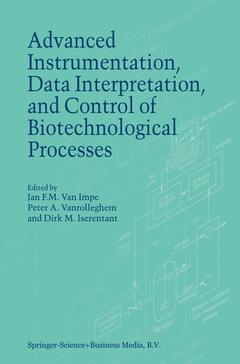Description
Advanced Instrumentation, Data Interpretation, and Control of Biotechnological Processes, Softcover reprint of hardcover 1st ed. 1998
Coordinators: van Impe J.F., Vanrolleghem P.A., Iserentant D.M.
Language: English
Subjects for Advanced Instrumentation, Data Interpretation, and...:
Publication date: 12-2010
464 p. · 15.5x23.5 cm · Paperback
464 p. · 15.5x23.5 cm · Paperback
Description
/li>Contents
/li>Comment
/li>
This book is the outgrowth of the COMETT II Course on Advanced Instru mentation, Data Interpretation, and Control of Biotechnological Processes organized by the Katholieke Universiteit Leuven and the Universiteit Gent, and held at Gent, Belgium, October 1994. The editors of the present volume were very fortunate to find all invited speakers prepared to write state-of-the-art expositions based on their lec tures. Special thanks are due to all of them. The result is an account of recent advances in instrumentation, data interpretation, and model based op timization and control of bioprocesses. For anyone interested in this emerg ing field, this text is of value and provides comprehensive reviews as well as new and important trends and directions for the future, motivated and illustrated by a wealth of applications. The typesetting of all this material represented a tremendous amount of work. I am most grateful to my wife, Myriam Uyttendaele, and to Kurt Gheys, who did most of the proof-reading. Their efforts have increased a lot the uniformity in style and presentation of the different manuscripts. Many thanks also to the co-editors, for their continued support. Kluwer Academic Publishers is gratefully acknowledged for publishing this book, thus contributing to the transfer of the latest research results into large scale industrial applications.
I: Hardware Sensors. 1. Flow Injection Analysis for On-Line Monitoring of a Waste-Water Treatment Plant. 2. On-Line Measurement of Viable Biomass. 3. Membrane Inlet Mass Spectrometry for the Characterization and Monitoring of Biotechnological Processes. 4. Flow Cytometry. 5. Microcalorimetric Characterization of Bacterial Inocula. II: Model Based Control. 6. On- Line Data Acquisition. 7. Data Processing for System Identification. 8. Error Diagnosis and Data Reconciliation Using Linear Conservation Relations. 9. General Concepts of Bioprocess Modeling. 10. Bioprocess Model Identification. 11. Optimal Control of Fed-Batch Fermentation Processes. 12. Monitoring and Adaptive Control of Bioprocesses. 13. Optimal Adaptive Control of Fed-Batch Fermentation Processes. 14. Predictive Control in Biotechnology Using Fuzzy and Neural Models.
The scope of the field of biotechnological processes is very wide, covering such processes as fermentations for production of high-valued specialist chemicals (e.g. pharmaceuticals), high-volume production of foods and feeds (e.g. yoghurt, cheese, beer), as well as biological waste treatment, handling solid (composting), liquid (activated sludge) and gaseous wastes (biofilters). Compared to other engineering disciplines, the introduction of modern optimization and control strategies is lagging behind. Two main reasons can be identified. First, the living organisms (or part thereof) that are central to these processes make the mathematical modeling of the processes a difficult task, and, since models are central to the development of control systems, the on-line control problem is also comp
© 2024 LAVOISIER S.A.S.



